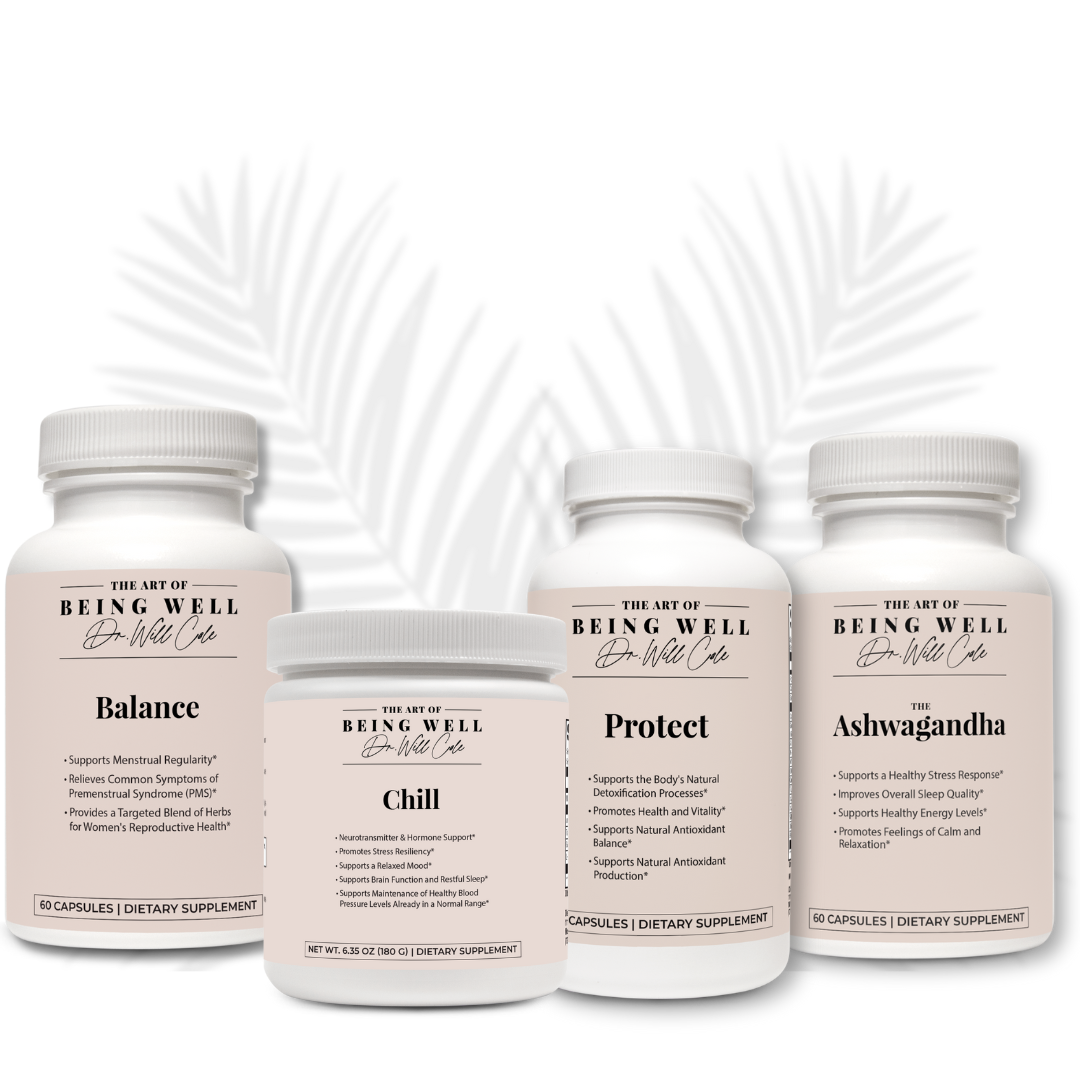How Holistic Health Is Empowering Women To Reclaim Their Wellness

Holistic health is an approach to wellness that considers all aspects of a person’s health, including physical, mental, and emotional factors. It goes beyond symptom management to get to the root cause of a person’s health problems.
For women, it can be particularly empowering to embrace a holistic approach to hormonal changes, stress management, and reproductive health. This is especially true if you’ve felt dismissed by conventional doctors who blame how you feel on aging or downplay symptoms, which is maddeningly common.
Women face unique health challenges, and holistic women’s health encourages proactive, whole-person focused care for long-term sustainable health.
Holistic Women’s Health = Better Women’s Health
Holistic wellness for women doesn’t limit itself to a single approach. There is a wide range of treatment options available that may include a combination of alternative therapies and conventional medicine as needed.
This gives patients a variety of benefits and autonomy over healthcare decisions that are unique to holistic health. It’s preventative, patient-centered, and individualized to each patient’s unique needs and health case.
Women have their own special set of healthcare needs that are unique and different from those of men. That’s where we often see the disconnect in conventional medicine. It has been all too easy to dismiss symptoms that are ultimately part of a larger, underlying problem with their overall health.
The role of functional medicine for women’s health is to use the principles of holistic medicine to address the most common problems specific to women. These may include:
- Low libido
- Endometriosis
- Fatigue
- Infertility
- Hot flashes
- Hormone imbalances
- Irregular periods
- Painful periods
- Mood swings
- Polycystic ovary syndrome (PCOS)
- Thyroid problems
- Weight loss resistance
Gynecology
Holistic approaches to women’s health focus on identifying and addressing the root causes of issues like ovarian cysts and severe symptoms of premenstrual syndrome (PMS). Conventional methods generally rely more heavily on managing symptoms with medication.
While a traditional gynecologist may just prescribe hormone-disruptive birth control to regulate periods, a holistic practitioner often starts with lab testing to better assess hormone levels and thyroid function. Thyroid function, in particular, is directly related to health issues and the regularity of menstrual cycles. (1)
This is beneficial for women who want to avoid potential side effects of long-term birth control use and prefer a more natural approach to rebalancing their endocrine system.
Natural approaches may include changes to diet for hormonal health needs or herbal remedies for PMS symptoms. Some women may benefit from seed cycling, where certain seeds are consumed during different phases of the menstrual cycle to support balanced estrogen and progesterone.
Holistic approaches also consider stress management, emotional well-being, and environmental factors, which play a significant role in women’s reproductive health.
That said, traditional gynecological services are still important, particularly for routine screenings like pap smears that detect cervical cancer and testing for infections. A holistic approach can be integrative and complement these services by focusing on prevention and long-term health. (2)
Obstetrics
Holistic obstetrics addresses not only the physical health of pregnant and postpartum women but also their emotional, mental, and spiritual needs. Traditional obstetrics tends to prioritize medical interventions, while holistic care emphasizes natural or alternative treatments.
For example, a holistic approach may include practices like prenatal yoga, nutrition counseling, and stress management to support a healthy pregnancy. The goal is to reduce the need for drugs or invasive procedures while promoting a more empowered birthing experience.
In postpartum care, holistic obstetrics involves comprehensive support for recovery and mental well-being. (3) While traditional care may focus on physical healing, holistic care combines mental health practices to help new mothers cope with stress and spot signs of postpartum depression.
A holistic practitioner may also recommend herbal remedies, lactation support, or treatments like pelvic floor therapy to support different areas of postpartum recovery.
Again, conventional medicine can work in tandem with holistic care, especially in complicated pregnancies. A more personalized, nurturing approach encourages a smoother transition into motherhood and recognizes the profound changes a woman undergoes during pregnancy.
The hope is always for long-term physical and emotional well-being for both the mother and baby.
Hormonal Treatments
In conventional women’s healthcare, hormonal treatments typically involve medications that directly alter hormone levels. This may include birth control pills, hormone replacement therapy (HRT), or synthetic hormones.
These approaches aim to manage symptoms of hormone imbalances, like estrogen dominance, menopause, or irregular menstrual cycles, but they don’t always address the root cause.
LISTEN: Menstrual Cycle, Menopause & Hormone Replacement Therapy Myths & Truths | Esther Blum
In the case of estrogen dominance, conventional treatment may involve prescribing medications like aromatase inhibitors and GnRH agonists to lower estrogen production. (4) Women with high estrogen levels from ovarian or breast cancer may sometimes be referred for surgical procedures.
While there is a time and place for more heavy-duty treatment plans, most women shouldn’t start there. Holistic health takes a whole-person approach to balancing hormone levels. Diet, natural supplements, stress management, and detoxification can all have an effect on estrogen levels.
Holistic care emphasizes lifestyle adjustments that naturally restore hormone balance over time. This is essential to managing significant hormonal shifts that happen during perimenopause and menopause, as well as helping reduce your risk of aging-related inflammatory disorders like osteoporosis. (5)
Better sleep, more balanced blood sugar, and reduced cortisol production through lifestyle changes and natural alternatives can reduce the severity of menopause symptoms. (6) Holistic care also supports hormonal health and healthier aging in the long term.
It’s Not Just About The Physical
Stress management is essential to hormonal health, so any holistic approach to women’s health considers the impacts of stress on existing symptoms and health conditions. Holistic medicine for women emphasizes emotional balance and improved inner well-being.
When you’re stressed, your body releases more of the stress hormone cortisol, which disrupts hormonal balance. (7) This can trigger weight gain, weaken your immune system, mess with your sleep, and increase your risk of developing chronic conditions.
Doctors for holistic women’s health may then recommend practices like mindfulness, meditation, and grounding to manage anxiety and emotional stress. Practices like yoga, breathwork, and connecting with nature can also nurture a sense of peace and alignment.
The mind-body connection is such an important aspect of women’s health. These habits support overall mental clarity, resilience, and self-awareness, promoting harmony between the mind, body, and spirit for a more balanced approach to wellness.
Your Voice Is Valued
Holistic women's wellness puts the power back into the patient's hands. It gives women a voice and allows them to share all of their symptoms so that we can find a solution for long-term, sustainable healing.
The approach is all about genuinely listening to women’s concerns about their own health and valuing their experiences. Unlike conventional medicine, which so often focuses on quick solutions to symptoms, holistic practitioners look at the whole person through an open dialogue.
Women are encouraged to express their emotional, physical, and mental health concerns; those insights play a key role in shaping their care plan. Years of experience or a doctor’s board-certified status don’t matter when you’re feeling dismissed. You know your body best.
When it comes to holistic women’s health, it’s my job to ensure that each patient is truly heard and that health problems are addressed in a way that facilitates healing in all areas.
The best part is that leading with empathy isn’t just great for helping women feel heard. It also leads to more personalized, effective care than a one-size-fits-all prescription.
A Functional Approach To Women’s Health
Conventional medicine uses labs that calculate the average from the results of every patient who receives labs. This can skew a practitioner’s understanding of what’s “healthy” or within the normal range.
Functional medicine offers a different solution with narrower reference points to get to the root cause behind women’s health problems. That’s the best way to feel better, age better, and rebalance your hormones long-term.
You can take back control of your health.
Book a consultation to learn more about how holistic, functional medicine can help you find relief. As one of the first functional medicine telehealth clinics in the world, we provide webcam health consultations for people around the globe.
FAQs
Start Your Health Journey Today
FUNCTIONAL MEDICINE CONSULTATIONS FOR PEOPLE AROUND THE WORLD
The information on this website has not been evaluated by the Food & Drug Administration or any other medical body. We do not aim to diagnose, treat, cure or prevent any illness or disease. Information is shared for educational purposes only. You must consult your doctor before acting on any content on this website, especially if you are pregnant, nursing, taking medication, or have a medical condition.
Our content may include products that have been independently chosen and recommended by Dr. Will Cole and our editors. If you purchase something mentioned in this article, we may earn a small commission.

BY DR. WILL COLE
Dr. Will Cole, DNM, IFMCP, DC is a leading functional medicine expert who consults people around the globe, starting one of the first functional medicine telehealth centers in the world. Named one of the top 50 functional and integrative doctors in the nation, Dr. Will Cole provides a functional medicine approach for thyroid issues, autoimmune conditions, hormonal imbalances, digestive disorders, and brain problems. He is also the host of the popular The Art of Being Well podcast and the New York Times bestselling author of Intuitive Fasting, Ketotarian, Gut Feelings, and The Inflammation Spectrum.

Gut Feelings
Healing The Shame-Fueled Relationship
Between What You Eat And How You Feel



